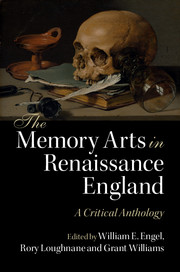Book contents
- Frontmatter
- Dedication
- Contents
- List of figures
- Acknowledgements
- A note on abbreviations
- Introduction
- PART I The art of memory
- PART II Rhetoric and poetics
- PART III Education and science
- PART IV History and philosophy
- PART V Religion and devotion
- PART VI Literature
- Introduction to Part VI
- POETRY
- PLAYS AND PROSE
- VI.11 Thomas Nashe, The Unfortunate Traveller (1594)
- VI.12 William Shakespeare, selected works
- VI.13 John Webster, selected works
- VI.14 Thomas Tomkis, Lingua: or the Combat of the Tongue (1607)
- VI.15 Mary Wroth, Urania (1621)
- VI.16 John Earle, Microcosmography (1628)
- VI.17 John Jones, Adrasta (1635)
- VI.18 Thomas Browne, Hydriotaphia, Urn-Burial (1658)
- VI.19 Anon., Crackfart and Tony; or, Knave and Fool (1680)
- VI.20 John Bunyan, The Pilgrim's Progress (1681)
- Index
- References
VI.16 - John Earle, Microcosmography (1628)
from PLAYS AND PROSE
Published online by Cambridge University Press: 05 August 2016
- Frontmatter
- Dedication
- Contents
- List of figures
- Acknowledgements
- A note on abbreviations
- Introduction
- PART I The art of memory
- PART II Rhetoric and poetics
- PART III Education and science
- PART IV History and philosophy
- PART V Religion and devotion
- PART VI Literature
- Introduction to Part VI
- POETRY
- PLAYS AND PROSE
- VI.11 Thomas Nashe, The Unfortunate Traveller (1594)
- VI.12 William Shakespeare, selected works
- VI.13 John Webster, selected works
- VI.14 Thomas Tomkis, Lingua: or the Combat of the Tongue (1607)
- VI.15 Mary Wroth, Urania (1621)
- VI.16 John Earle, Microcosmography (1628)
- VI.17 John Jones, Adrasta (1635)
- VI.18 Thomas Browne, Hydriotaphia, Urn-Burial (1658)
- VI.19 Anon., Crackfart and Tony; or, Knave and Fool (1680)
- VI.20 John Bunyan, The Pilgrim's Progress (1681)
- Index
- References
Summary
About the author
John Earle (1601?– 65) went into exile during the religio-political quagmire of the 1640s and from 1651 attended Charles II's entourage in Paris. After the Restoration of the monarchy, he was appointed Dean of Westminster and later Bishop of Salisbury.
About the text
The text from which the excerpt derives gathers fifty-five miniature essays on characters in imitation of the Theophrastan tradition introduced to the continent by Isaac Casaubon and popularised by Joseph Hall and Thomas Overbury in England. Having gone through twelve editions in the seventeenth century, the book did not bear Earle's name until the eighteenth. Earle possesses a gentler satirical edge than other English Theophrastan writers have, perhaps because, as the title suggests, he maps out the ‘microcosm’ through describing various public personae, such as an alderman, a constable and a university don. Earle's antiquarian, depicted below, may have been modelled on Robert Glover or William Camden, both of whom were noteworthy heralds known for their meticulous genealogical work.
The arts of memory
The excerpt, suggestive of Sidney's portrait of the historian in The Defence of Poesy, invokes the memory arts from several perspectives. In general, the Theophrastan character – a rhetorical genre of sorts on a par with prosopographia and ethopoeia – belongs to a quaint rogues’ gallery, furnishing readers with a storehouse of imagines agentes of moral and psychological types, each of whom inhabits a colourful social space. More specifically, there could not be a more apt occupation for existentially embodying the early modern act of remembering than the antiquarian, deriving from the Latin antiquarius, which means ‘pertaining to ancient times’. Earle's character appears obsessed with protecting history's fragile remainders from slipping into extinction. The antiquarian wallows in an aesthetics of decay. He blindly fetishises the malingering, mouldering persistence of the past in its many material manifestations, no doubt prompting the description's final turn to the contemptus mundi motif.
Textual notes
Micro-cosmographie, or, A peece of the world discovered in essayes and characters (London, 1628), C1v–C3v.
Microcosmography
An Antiquary
He is a man strangely thrifty of time past, and an enemy indeed to his maw, whence he fetches out many things when they are now all rotten and stinking.
- Type
- Chapter
- Information
- The Memory Arts in Renaissance EnglandA Critical Anthology, pp. 343 - 346Publisher: Cambridge University PressPrint publication year: 2016



